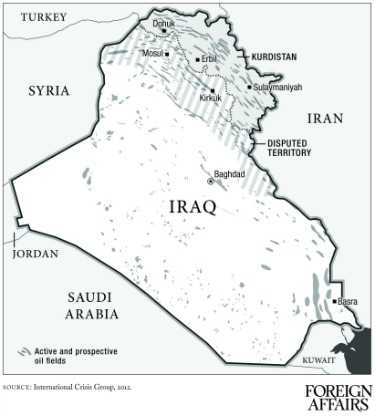Oil has played a significant role in creating and sustaining states in the Middle East. Since the Qajar Shah of Iran signed the first oil deal with William D’Arcy in 1901, oil money has been used to centralize power, fund an era of modernity, and build elaborate welfare states across the Middle East. Could Iraqi Kurdistan be the next state to buy its independence with oil? Unfortunately, the cards still seem to be stacked against Kurdish independence. As Joost Hiltermann correctly argues in the latest issue of Foreign Policy the “Kurds will have to defer their quest for statehood once again”.
 Nothing seems brighter than the present for Iraqi Kurdistan. Matthew Byrza, a former U.S. diplomat and energy expert, recently estimated oil reserves in northern Iraq, a region largely under Kurdish control, at 45 billion barrels. At $85 per barrel, that is a whopping $3.825 trillion locked up under Iraqi Kurdistan! Currently, the semi-autonomous Kurdistan Region Government (KRG), based in Erbil, has an agreement with Baghdad to pump 200,000 barrels of oil a day through existing Iraqi pipelines in exchange for a large share of the annual Iraqi budget. Although Kurdish leaders have been able to leverage their oil against Baghdad, the existing agreement makes Erbil dependent on the central Iraqi government.
Nothing seems brighter than the present for Iraqi Kurdistan. Matthew Byrza, a former U.S. diplomat and energy expert, recently estimated oil reserves in northern Iraq, a region largely under Kurdish control, at 45 billion barrels. At $85 per barrel, that is a whopping $3.825 trillion locked up under Iraqi Kurdistan! Currently, the semi-autonomous Kurdistan Region Government (KRG), based in Erbil, has an agreement with Baghdad to pump 200,000 barrels of oil a day through existing Iraqi pipelines in exchange for a large share of the annual Iraqi budget. Although Kurdish leaders have been able to leverage their oil against Baghdad, the existing agreement makes Erbil dependent on the central Iraqi government.
Breaking their dependence on Baghdad is critical for Kurdish independence. Talk of a recent pipeline to run directly from Iraqi Kurdistan to Turkey and exclusive exploration deals with major oil companies like ExxonMobile bring the Kurdish Regional Government closer to a big payday. The KRG recently signed contracts, amounting to over $20 million, to sell their oil directly on international markets. The oil is to be trucked over-land to shipping terminals in Turkey where it will be bought by two Swiss trading companies. Surely, this process will grow faster and more lucrative if the pipeline through Turkey is completed.
However, as Hiltermann also argues in Foreign Policy, this creates a trap for Kurdish independence. The land-locked geography of Iraqi Kurdistan means that while it may break from Iraq’s hold, it will still be dependent on Turkey for economic survival. While Turkey may seem more receptive to a Kurdish state in northern Iraq, it certainly has its list of worries. Turkish support for an independent Iraqi Kurdistan could empower Turkey’s own Kurdish separatist movement and further inflame the current relationship between Ankara and Baghdad. With Baghdad’s perceived support of the Assad regime in Syria, this could spell trouble on Turkey’s southern border.

KRG President Barzani (left) and Turkish Prime Minister Erdogan in Istanbul. (www.turkey.setimes.com)
Furthermore, an independent Kurdistan would be a serious setback for the democratic process in Iraq, possibly undermining the central control of the government and setting off a separatist movement which already has supporters in Iraq’s western Sunni regions. This destabilizing effect could lead to an increased foreign influence that would undo the years of political gerrymandering crafted by the United States. This sentiment is more than likely behind a recent message from the Obama administration which informed the KRG that the U.S. and Turkey will not support any bid for Kurdish independence. The administration expressed its wish for the KRG to normalize relations with Baghdad and settle disputes within the framework of the Iraqi constitution.
Although Iraqi Kurdistan sits atop a massive amount of oil, turning that oil into cash is nearly impossible without Baghdad. While Turkey is in a position to assist Kurdish energy sales, that assistance comes with significant risks. Even if Turkey allows a Kurdish pipeline to be completed it is likely that oil sales will only occur as part of a larger balancing act between Ankara, Erbil, and Baghdad. Finally, U.S. objection to Kurdish independence may be the hardest obstacle to overcome. After nearly ten years of war, thousands of casualties, and billions of dollars it is very unlikely that the U.S. will support the unraveling of their nation-building experiment.
As it has throughout modern history, it appears that the Kurdish dream of independence in Iraq lies just out of reach.

